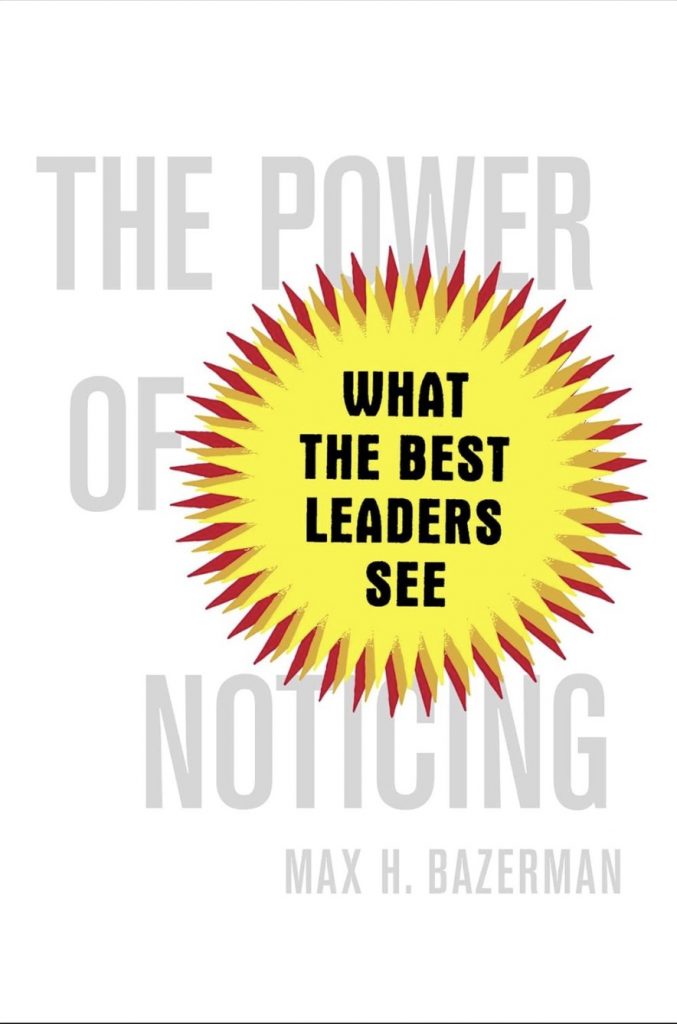Key Quote:
“A first-class noticer is someone with a good eye, especially for human behavior. First-class noticers are intensely attentive: they recognize talent and see opportunities that others miss. They are less likely than most to be blinded by what they want the data to be and more open to what the data suggests. Thanks to their tendency to think multiple steps ahead, they have the capacity to identify when change is needed and then make the change” (p. 181). — Max H. Bazerman
Key Points and Concepts
Importance of Complete Information
• “What’s in front of you is rarely all there is. Developing the tendency to ask questions like ‘What do I wish I knew?’ and ‘What additional information would help inform my decision?’ can make all the difference” (p. 5).
• “The magnitude by which people can miss seeing obvious visual information due to their focus elsewhere is truly amazing. Neisser called this phenomenon “inattentional blindness” (p. 12).
• “But it is the job of leaders to identify what information is needed and how to obtain that information, rather than acting on the information that is in the room” (p. 36).
• “When the other side in a negation makes a demand that doesn’t make sense to you, don’t assume they are acting irrationally. Instead stop and ask yourself what you might not know that could explain their actions – and whether they may be trying to misdirect you” (p. 79).
• “Whenever we are interacting with people who we believe do not have our best interests in mind, we need to look beyond the information they put in front of us and think about what they are trying to get us to do and how we can get the information we actually need” (pp. 84-85).
• “How do you notice missing information? … It requires that we learn to think about what normally will occur and notice when that does not take place…Noticing alerts us to seek out additional information” (p. 105).
The Role of Bias in Decision Making
• “…research in the field of behavioral ethics has found that when we have a vested self -interest in a situation, we have difficulty approaching that situation without bias, no matter how well calibrated we believe our moral compass to be” (p. 23).
• “We discount facts that contradict the conclusions we want to reach, and we uncritically accept evidence that supports our positions. Unaware of our skewed information processing, we erroneously conclude that our judgments are free of bias” (p. 53).
• “Regrettably, mounting research has provided evidence that the vast majority of executives and other leaders tend to be overconfident in their judgments” (p. 93).
• “Most people tend to be overconfident, and some experts have argued that overconfidence is the most important of all decision biases” (p. 94).
Paradox of “Complete” Information in Groups
“Across numerous studies, Stasser and Titus have shown that groups discuss shared information (my addition: information the entire group has) more often than unshared information (my addition: information only one or a few group members have). This is quite a paradox, since groups are often brought together for the very purpose of pooling information, yet groups consistently exhibit bounded awareness regarding their unique or unshared information” (pp. 83‐84).
Cynicism vs. Optimism
“Thinking one step ahead allows you to identify when to be trusting and when to be cynical. It is wise to think carefully about the decisions and motives of the other party so that you can understand what a problem looks like from his or her perspective. Thinking ahead may help you identify when reasons to trust exist and when you have justification to be cynical…In some situations it is fairly costless to collect additional information to test our intuition, but we often fail to do so. Your goal should be to understand the strategic behavior of others without destroying opportunities for trust building” (p. 150).
Direct/Indirect Effects
“The harms created by indirect effects are a leadership challenge. Leaders need to think beyond the moment to anticipate the problems that their organization’s procedures could create. When an organization sets up processes that lead people to unintentionally discriminate against a particular group, the organization is engaging in discrimination. The organization’s leaders are responsible for noticing this and for making the changes that are needed to prevent indirect harm from occurring” (p. 165).
Predictable Surprises
“A predictable surprise arises when organizational leaders have all the data they need to recognize the potential for a crisis, and even its inevitability, but fail to respond with effective preventative action…predictable surprises are a unique and significant consequence of the failure to notice important information and the failure to lead based on what you notice” (pp. 171-172).
3 Reasons Why Leaders Ignore Predictable Surprises?
• Cognitive – we view the world in a more positive light than is warranted; we tend to overly discount the future; and people, organizations, and nations tend to follow the rule of thumb “Do No Harm” which leads to doing nothing.
• Organizational – groups operate in “silos” and are decentralized, lacking clear oversight and organizational goals. “Do Your Job.”
• Political – the cost of sacrificing financially and politically in the short term outweighs the benefits of acting to avoid disaster in the medium
to long term.
Leadership Skill: Noticing
“A first-class noticer is someone with a good eye, especially for human behavior. First-class noticers are intensely attentive: they recognize talent and see opportunities that others miss. They are less likely than most to be blinded by what they want the data to be and more open to what the data suggests. Thanks to their tendency to think multiple steps ahead, they have the capacity to identify when change is needed and then make the change” (p. 181).
Internal Success/External Failure Paradigm
“A well-established social science research finding is that when we think of our successes, we tend to come up with internal attributions…By contrast, when we think of our failures, we tend to come up with external attributions; we blame others, the context, or circumstances beyond our control” (p. 183).
Inappropriate Objective Setting
“Organizations institute systems, including organizational structures, reward systems, and information systems, that affect what their employees will pay attention to – and what they will overlook (ex. my addition: Auditors primary goals are to keep customers happy, get rehired, and provide non-auditing services as well versus providing independent auditing services)” (p. 190).
In our rapidly changing world, even the most astute individuals can overlook crucial and accessible information in their surroundings. This oversight stems from our inherent cognitive bias to focus on a narrow range of data, effectively having on mental blinders that restrict our perception. However, Bazerman posits that the ability to recognize and utilize this often-overlooked information will be
a hallmark of effective leadership in the coming years.
Bazerman, M. (2014). The Power of Noticing: What the Best Leaders See. New York, New York: Simon & Schuster.

“What’s in front of you is rarely all there is. Developing the tendency to ask questions like ‘What do I wish I knew?’ and ‘What additional information would help inform my decision?’ can make all the difference.”
“A predictable surprise arises when organizational leaders have all the data they need to recognize the potential for a crisis, and even its inevitability, but fail to respond with effective preventative action… predictable surprises are a unique and significant consequence of the failure to notice important information and the failure to lead based on what you notice.”
“Organizations institute systems, including organizational structures, reward systems, and information systems, that affect what their employees will pay attention to – and what they will overlook. In our rapidly changing world, even the most astute individuals can overlook crucial and accessible information in their surroundings.”
